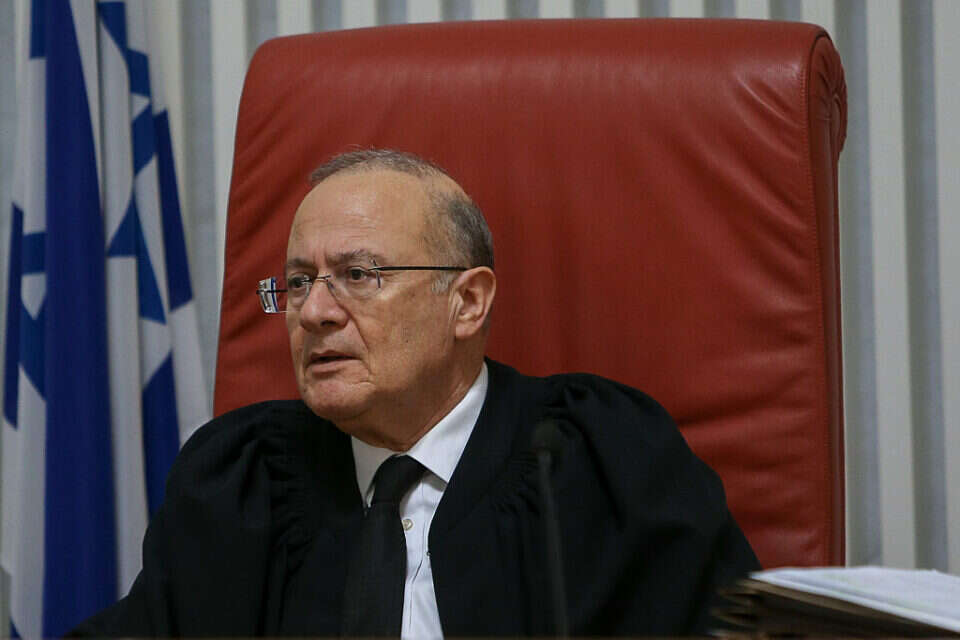Although the senority system has been in place for more than 70 years, it is not written, not in remote regulations and certainly not in a Basic Law. Thus, formally, Judge Elron's declaration and breaking the practice rests on a legally safe ground. However, his actual election to the position has low chances.
The Supreme Court, Photo: Oren Ben Hakon
Justice Minister Yariv Levin, who chairs the Judicial Selection Committee, does not hold Justice Elron in high esteem, but prefers him as Supreme Court President much more than Justice Yitzhak Amit, who is considered an activist. The problem is in numbers. In order to appoint Elron as Supreme President, a majority of five out of nine committee members is required.
The coalition has three members who will support, two members of the Bar Association are expected to oppose breaking the Seniority, as is opposition representative Karine Elharrar. The committee consists of three Supreme Court justices, and after Hayut's imminent retirement, Justices Yitzhak Amit, Uzi Fogelman and Noam Solberg will be members of the committee. The law requires a female judge, and Amit will not be able to participate in the vote, so it seems that Justice Barak-Erez will replace him. She and Fogelman are likely to disagree, and Judge Solberg has no interest in breaking the seniority because doing so would jeopardize his presidency in 2028.
So for now, Elron doesn't seem to have the necessary majority. The weak points are Solberg, who has a legal-ideological identity with Elron, and Bar Association representative Ilana Skakar, who took part in promoting Elron's election to the Supreme Court.
Judge Noam Solberg. Will not jeopardize his presidency, photo: Oren Ben Hakon
Elron has a poor relationship with most of the Supreme Court justices, some of whom even opposed the appointment to the Supreme Court. But it's not just about personal relationships, but from time to time ideological disagreements arise between them. For example, against Justice Yitzhak Amit, who, according to the Seniority, is a candidate for President of the Supreme Court.
In his ruling regarding the murderer of Noa Eyal, Justice Amit protested that the trial is going from "a discourse of evidence to a discourse of rights," and that the courts deal with the rights of suspects and defendants excessively. According to him, "it seems that the place of 'evidentiary evidence' is being abandoned in favor of claims of various flaws in the investigation and prosecution proceedings. In addition, there are claims of illegality of one act or another during the search, seizure, or interrogation, claims of protection from justice, and more," Justice Amit wrote, adding that this is a main reason for the continuation of the criminal proceedings.
Judge Yitzhak Amit (archive). A murky relationship, photo: Oren Ben Hakon
Justice Elron did not have to, and in a speech he gave in 2011 criticized Justice Amit, saying that "preserving rights in criminal proceedings is a cornerstone of the entire process. These rights have their place in legislation and jurisprudential law. Anyone who wishes to argue against a hearing or to restrict a hearing in a criminal proceeding, in my opinion, sets criminal law back years. Moreover, a flaw in the discourse of rights will undermine the delicate equilibrium in the conduct of criminal trials, which has been laboriously shaped by the rulings of courts throughout the ages."
Last July, Elron also discussed the remarks in an article he wrote called "The Criminal Law at a Crossroads," where Elron warned against discourse on "streamlining and speeding up the criminal process" as one that could harm the rights of suspects and defendants and come at their expense. "We may end up with undesirable legal consequences with which the sense of justice is incompatible," he wrote.
Supreme Court President Esther Hayut's unprecedented attack on the government // Photo: Shmuel Buchris
Elron's criticism was not reserved only for a fellow judge. Earlier this month, Justices Ruth Ronen and Yehiel Kasher overturned a prison sentence for a minor convicted of sodomy, indecent acts, extortion by threats and more at knifepoint. Judge Elron, who sat on the panel, criticized them, saying, "I find it difficult to feel that the result of the verdict focuses only on the case of the appellant – the offender; Whereas the case of the innocent victim – also a minor – is relegated to an angle."
Wrong? We'll fix it! If you find a mistake in the article, please share with us

